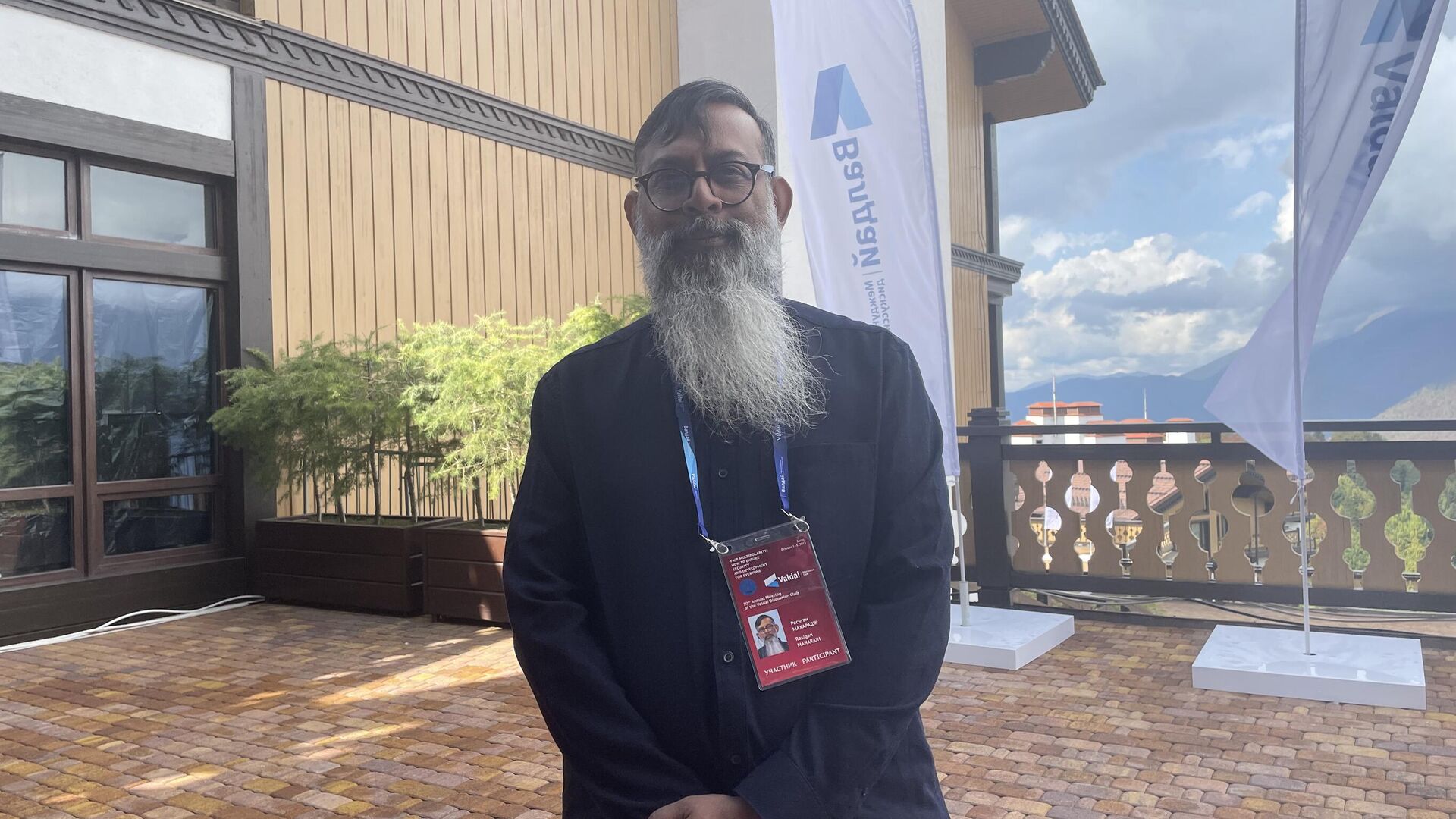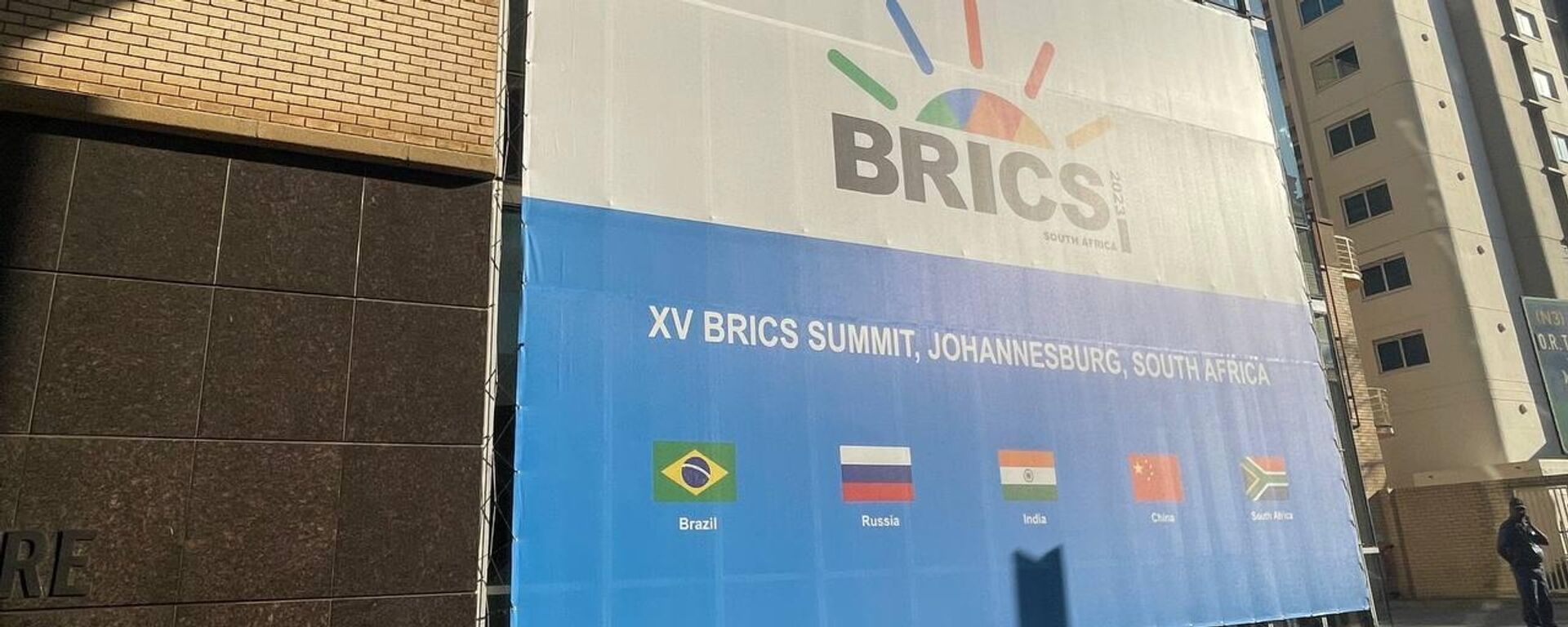https://en.sputniknews.africa/20231003/already-leaking-dam-to-turn-into-massive-flood-sa-expert-on-global-financial-system-1062511585.html
Already 'Leaking Dam' to Turn Into Massive Flood: SA Expert on Global Financial System
Already 'Leaking Dam' to Turn Into Massive Flood: SA Expert on Global Financial System
Sputnik Africa
Countries in the Global South have repeatedly drawn attention to the shortcomings of the current global financial architecture and its main institutions, which... 03.10.2023, Sputnik Africa
2023-10-03T15:55+0200
2023-10-03T15:55+0200
2023-10-03T15:55+0200
opinion
south africa
finance
international monetary fund (imf)
world bank
debt
brics
ukraine
cooperation
ditching dollar
https://cdn1.img.sputniknews.africa/img/07e7/0a/03/1062511030_0:257:2730:1793_1920x0_80_0_0_e8ba4f9363265fe5fc1d2b453c18923c.jpg
The international financial system is undergoing significant transformation, with the primary indication being the proliferation of trade in national currencies among emerging market economies, gradually breaking the reign of the dollar, said Dr. Rasigan Maharajh, Chief Director of the Institute for Economic Research and Innovation at Tshwane University of Technology, South Africa, in an interview with Sputnik Africa. According to the expert, many developing nations are currently in need for financial assistance for their development, particularly after the COVID-19 pandemic. However, he elaborated, they are burdened with an overwhelming amount of debt that is hindering their ability to tackle local and domestic challenges.African leaders have repeatedly accused international lenders such as the International Monetary Fund and the World Bank of charging exorbitant interest rates and being unwilling to meet their countries' needs. In this regard, the expert highlighted the inequitable nature of the current system, with the countries that require aid witnessing the most adverse impacts.Maharajh explained that in the last few decades, the instruments established after World War II, especially the Bretton Woods institutions, have only maintained, bolstered, and perpetuated the unequal system of international relations dominated by a single economy and its allies.Therefore, the expert went on to argue for the transformation of the global financial architecture to ensure the development of all nations, rather than the exclusive benefit of Western countries. He noted that the global financial institutions must help emerging economies and support their development aspirations, instead of hindering their progress.Maharajh touched upon the issue of Western financial support to Ukraine, stressing that African nations don't "understand these rich, advanced, mature, capitalist economies" that provide Kiev with weaponry and equipment, sending billions in aid. He underscored that these Western countries, instead of improving the well-being of their people and developing their economies, contribute to the escalation of the conflict. Commenting on the recent expansion of the BRICS group, which welcomed six new members in August, he observed that this development suggests a broader "alignment of forces" that represent the global majority. He added that while the economic bloc advocates for the interests of the majority, it is not "acting against the global minority."This point of view is in line with the position of Russian President Vladimir Putin, who said that the BRICS group is not a military alliance, but a platform for developing mutually beneficial cooperation based on sovereignty and respect for each other.
https://en.sputniknews.africa/20230914/de-dollarization-accelerating-within-brics-across-globe-investment-company-says-1062099915.html
https://en.sputniknews.africa/20230822/brics-lead-debate-on-fixing-global-financial-system-formal-decisions-expected-at-summit-academic-1061516869.html
south africa
ukraine
Sputnik Africa
feedback@sputniknews.com
+74956456601
MIA „Rossiya Segodnya“
2023
News
en_EN
Sputnik Africa
feedback@sputniknews.com
+74956456601
MIA „Rossiya Segodnya“
Sputnik Africa
feedback@sputniknews.com
+74956456601
MIA „Rossiya Segodnya“
south africa, finance, international monetary fund (imf), world bank, debt, brics, ukraine, cooperation, ditching dollar, de-dollarization
south africa, finance, international monetary fund (imf), world bank, debt, brics, ukraine, cooperation, ditching dollar, de-dollarization
Already 'Leaking Dam' to Turn Into Massive Flood: SA Expert on Global Financial System
Countries in the Global South have repeatedly drawn attention to the shortcomings of the current global financial architecture and its main institutions, which have held sway in international relations for several decades. The need of transforming the system so that it reflects the interests of the developing world has been consistently emphasized.
The international financial system is undergoing significant transformation, with the primary indication being the proliferation of trade in national currencies among emerging market economies, gradually breaking the reign of the
dollar, said
Dr. Rasigan Maharajh, Chief Director of the Institute for Economic Research and Innovation at Tshwane University of Technology, South Africa, in an interview with
Sputnik Africa.
"I think we are already seeing [that] this dam has already been broken, it is leaking, and soon that leak will turn into a flood because of the real experiences of developing countries requiring finance," he said.
According to the expert, many developing nations are currently in need for financial assistance for their development, particularly after the COVID-19 pandemic. However, he elaborated, they are burdened with an overwhelming amount of debt that is hindering their ability to tackle local and domestic challenges.
African leaders have repeatedly accused international lenders such as the International Monetary Fund and the World Bank of charging exorbitant interest rates and being unwilling to meet their countries' needs. In this regard, the expert highlighted the
inequitable nature of the current system, with the countries that require aid witnessing the most adverse impacts.
"Therefore, it's important that people are able to trade their way out of such situations using their own currencies. And this is the praxis that's being picked up," Maharajh emphasized.
Maharajh explained that in the last few decades, the instruments established after World War II, especially the Bretton Woods institutions, have only maintained, bolstered, and perpetuated the unequal system of international relations dominated by a single economy and its allies.
Therefore, the expert went on to argue for the
transformation of the global financial architecture to ensure the development of all nations, rather than the exclusive benefit of Western countries. He noted that the global financial institutions must help emerging economies and support their development aspirations, instead of hindering their progress.
"The Bretton Woods institutions and others have served merely to support, to prop up and reproduce the unequal exchange dominated by a single economy [...]. We need to transform Bretton Woods. We need all of the world's people participating in determining what international, multilateral fora are necessary for us," he pointed out.
Maharajh touched upon the issue of Western financial support to Ukraine, stressing that African nations don't "understand these rich, advanced, mature, capitalist economies" that provide Kiev with weaponry and equipment, sending billions in aid. He underscored that these Western countries, instead of improving the well-being of their people and developing their economies, contribute to the escalation of the
conflict.
"Capitalist economies continue to spend money on sending arms into a conflict, in other words, escalating the conflict as opposed to addressing the real dire needs within their own countries," he said.
Commenting on the recent expansion of the BRICS group, which welcomed six new members in August, he observed that this development suggests a broader "alignment of forces" that represent the global majority. He added that while the
economic bloc advocates for the interests of the majority, it is not "acting against the global minority."
This point of view is in line with the position of Russian President Vladimir Putin, who said that the BRICS group is not a military alliance, but a platform for developing mutually beneficial cooperation based on sovereignty and respect for each other.



